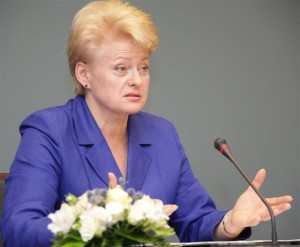VILNIUS — Lithuanian President Dalia Grybauskaitė is proposing changes to the country’s business competition laws that could shake up certain industries dominated by a small group of companies.
Following campaign promises, Grybauskaitė is calling for increased regulation of the country’s most powerful companies to make sure they are not conducting anti-competitive activities. She also supports lowering the market share threshold for when such rules would apply.
Current Lithuanian competition law sets the bar for existing regulation to take effect if a company’s concentration exceeds 40 percent in a particular market. The coalition is considering lowering this to 30 percent.
“The market economy in Lithuania is practically non-existent, instead there is monopoly economy. The government and the state can and must intervene in that, especially in such critical times,” Grybauskaitė said.
Linas Balsys, one of the president’s chief advisers, told Baltic Reports that the aim of the reform is open up certain sectors for investment.
“We have monopoly in the energy sector, there is no opportunity to open up the market and liberalize. It’s better for consumers to bring prices down. You can’t do that without competition,” Balsys said. “We have the oil refinery, which is kind of a monopoly. Even in the food trading sector, we also have some monopolies.”
Nerijus Udrėnas, Grybauskaitė’s chief economic adviser, told Baltic Reports that the monopolies in certain sectors have arisen because of the country’s post-Soviet economic development and that reform was needed for the country to more fully integrate into the European Union’s single market.
“We used to be a small market, when we were outside the EU. We inherited certain behaviors, certain rules, certain habits. As we joined the EU … we enjoyed rapid economic growth that allowed for prices to increase very rapidly as well as costs and salaries,” Udrėnas said. “Distributors and suppliers were able to pass on increases in prices to customers very easily.”
Grybauskaitė has singled out the energy, utilities and retail sectors, among others, as being dominated by too few companies.
“Those sectors are maybe first, energy, utilities and retail but we need to investigate others and make suggestions to the government as to what steps need to be taken,” Udrėnas told Baltic Reports. “These companies that will be above the threshold will have to undergo much heavier administrative tasks to show transparently that they do not discriminate against other suppliers and competitors.”
May discourage foreign investment
The president’s proposal is meeting opposition from economists and business associations. Udrėnas’s former co-worker, SEB economist Gitanas Nausėda says the reform may actually discourage foreign investment.
“Maybe it would create some false signals to international business society. They will start to think the Lithuanian economy will go back to a higher regulation of the economy …. it would be bad for Lithuania,” Nausėda told Baltic Reports. “There are some factors that are characterized by high levels of concentration, even monopoly. Some of them are natural monopolies, we can’t change them.”
To be a monopoly or not to be?
Meanwhile the country’s top retail trade association says the president’s characterization of the country’s retail and food sales industry as monopolized is inaccurate.
“I haven’t ever seen a monopoly of four or six chains. Monopoly we can find in gas sector, oil sector, also in telephone, heating and water supply for citizens. There we can see the monopoly,” Marius Busilas, chief executive manager of the Association of Lithuanian Trade Enterprises, told Baltic Reports. “Competition between the chains is very hard at the moment. It is not easy. I do not agree with the president, I think it needs more discussion about what is a monopoly.”
The biggest player in Lithuanian retail is the Vilniaus Prekyba Grupė, or VP Group, which controls 36 percent of the market through Maxima LT and other subsidiaries. Maxima LT spokesperson Renata Saulytė discounted any characterization of her company as monopolistic.
“We are not a monopoly at the moment,” Saulytė told Baltic Reports. “But if we talk about the future, who knows how it will be?”
However, the president’s office says especially in food retail, too few hands hold too much. Udrėnas said Lithuania’s food distribution network is too closed.
“The president has showed she wants to increase the distribution network of suppliers and producers … to include ecological products
and to control this threshold of market share,” Udrėnas told Baltic Reports.
Coalition is supportive
Regardless of big business’ doubts, the conservative coalition is receptive to the president’s proposals. Economy Minister Dainius Kreivys has spoken in support of the reforms, and Prime Minister Andrius Kubilius has railed against monopolies in Lithuania’s energy sector.
“One of the main goals set in the strategy is to minimize dependency of Lithuania on monopolistic suppliers; therefore, diversification of primary energy sources is a priority,” Kubilius said during a recent speech in Riga.














It would be interesting to see a comparison of supermarket shelf prices versus farm gate prices for foodsuffs in Lithuania and (say) the US,UK etc. That would show how the retailers here take advantage of their dominant position.